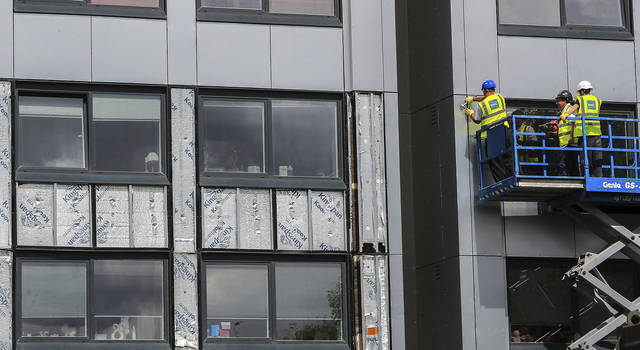LONDON — Arconic, the metal products maker that was once part of Alcoa Inc., said Monday it will stop selling one type of aluminum composite paneling for use on high-rise buildings after speculation that the material contributed to the spread
LONDON — Arconic, the metal products maker that was once part of Alcoa Inc., said Monday it will stop selling one type of aluminum composite paneling for use on high-rise buildings after speculation that the material contributed to the spread of a deadly fire at a London apartment tower.
Reynobond PE, which has a polyethylene core, will no longer be sold for high-rise projects, New York-based Arconic said in a statement. The company also makes another type of panel — Reynobond FR — which is fire-resistant.
“We believe this is the right decision because of the inconsistency of building codes across the world and issues that have arisen in the wake of the Grenfell Tower,” Arconic said in a statement. “We will continue to fully support the authorities as they investigate this.”
The company’s shares fell as much as 11 percent Monday and closed down 6 percent at $24.01 in New York following weekend news reports that Arconic sold the panels installed on Grenfell Tower knowing they would be used on a high-rise building.
In a statement late Monday, Arconic acknowledged it supplied Reynobond FR to a fabricator which used it as a component on Grenfell Tower’s cladding system. Other parts of the cladding, including its insulation, were supplied by others, it said.
It added that it sold its product with the expectation it would be used in compliance with local building codes.
“Our product is one component in the overall cladding system; we don’t control the overall system or its compliance,” Arconic said.
The company previously had warned that such panels posed a fire risk on tall buildings.
At least five law firms announced Monday that they were investigating claims on behalf of Arconic shareholders who have lost money on their investments since the fire.
London’s Metropolitan Police said Friday it was investigating what role aluminum composite panels, the insulation behind them and the installation of the overall exterior cladding system played in the June 14 Grenfell Tower fire that killed at least 79 people.
“Our tests will look at each aspect individually, as well as how they all worked together as part of the building’s cladding,” police said in a statement.
The U.K. government is scrambling to test cladding materials similar to those used at the destroyed tower, hoping to better understand fire-safety risks nationwide.
Arconic’s announcement came as the government announced that cladding material from 75 buildings in 26 local authorities had failed combustibility tests. Communities and Local Government Secretary Sajid Javid said samples from every building tested so far had failed.
“The fact that all samples so far have failed underlines the value of the testing program and the vital importance of submitting samples urgently,” Javid said. “I am concerned about the speed at which samples are being submitted.”
Meanwhile, Britain’s government says it is giving 1 million pounds ($1.27 million) to charities helping fire victims. Javid said the figure recognizes that small charities and not-for-profit organizations are making a contribution to the relief effort.
The funding is in addition to 5 million pounds provided for the Grenfell Tower Residents’ Discretionary Fund.




